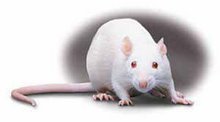Brothers and Sisters, I come before you now to report that one of our congregation, the reverend Dr. Francis Collins, Director of the National Human Genome Institute, has testified of his love of the Lord. Ye-es!
http://www.cnn.com/2007/US/04/03/collins.commentary/index.html
Do you see the light? I sa-id, Do you see the light, brother?Back in the Dark Ages, when Europe languished under the yolk of the Catholic church, and all science was faith-based, the few scientists and doctors allowed to study their profession were forced to have as their driving force NOT the pursuit of the unknown interactions of their environment, but the search for God in the workings of life. I think of Roger Bacon, searching for holiness in the refraction of light in rainbows, for instance. There’s a reason why it was called the Dark Ages. What we didn’t know was explained away as the workings of God, not to be explored without consent from the Church. Long before that, even before the prototypical Greek enlightenment, were tribal beliefs, still found in the dark jungles and vast savannas of the world, where all the unknown was explained with magic and mysterious gods.
Now the director of the human genome project has fallen into the same holy trap.
Collins’ goal, in his letter to CNN, was to profess his belief in Christianity, his theological exploration that led him there, and that scientists can pursue their science just fine and rationally, thank you, while still believing in God and faith. He elaborates by suggesting that science is correct in its analysis of the world, including evolution, but that the source of the world’s complexity, and even the source of the first evolutionary steps of life, is not a random event or process but the hand of God. That somehow it all fits into a celestial plan.
We’ve heard this before. It’s called Intelligent Design.
As I’ve mentioned in a previous post, Intelligent Design is nothing more than Creationism cloaked in pseudo-scientific babble. There is nothing testable about it, and that makes it untenable for serious scientific scrutiny. Worse, it is a cop-out no different from the alchemical stumblings of the Dark Ages and tribal worship. Yes, my flock, let us fall to our knees at our lab benches and pray, for we must be on the cusp of finding God at the edge of the unknown.
Scientists can believe whatever they wish when they walk around on the streets, go home, or attend church. There is comfort in thinking that some paternal hand is guiding the seeming chaotic nature of our world. But when you walk through the lab door, check your faith at the coat rack. The danger here is obvious. When you start believing that the truth you are searching for is one taken on faith, you start overlooking data and pursuing the wrong path. In fact, like the alchemists of the Dark Ages, it blinds you to progress until it stops you altogether. At some point further experimentation runs against the walls of dogma and becomes blasphemy. Think here about Galileo and his run-in with the inquisition. As science has progressed, every hundred years or so that wall of dogma gets pushed back a little further, such that we can now accept that the Earth revolves around the sun, for instance, or that species change their morphology and DNA from generation to generation, mediated by natural selection, to slowly form a new species. Though Creationists argue against evolution, even the Vatican admits the evidence for it has substance. Now neoconservatives like Collins have pushed the wall of dogma back further, once again, to the dim envelope of science, and said that THERE, at the base of all evolutionary beginnings, or at the moment of the Big Bang, we can know the finger of God.
Eventually science will open those doors, too, and find only godless, rational data and a fractal-like, ever-expanding set of questions to be explored. There will always be conservatives there, too, pointing the finger down those dark hallways and saying that God is just down the next corridor.
And how will Collins’ belief structure change his role in analyzing the human genome? Who knows? Will he steer his lab rats away from exploring the function of human embryonic stem cells, for instance? Will he attempt to find the finger of god in those moments of genetic divergence hidden in our DNA, overlooking some crucial factor that would shed light on natural speciation? If any data goes against the prevailing neoconservative agenda, will he have an open mind enough to question those beliefs, or will the data be shelved, ignored, or buried?
HERE is an excellent and funny schematic demonstrating the difference between science and faith (from Wellington Grey’s blog).
Thump your Bible as you please, Dr. Collins. Just don’t bring it in the lab.
Can I get an Amen?
Subscribe to:
Post Comments (Atom)



1 comment:
Thank you for linking to my site.
-Grey
Post a Comment